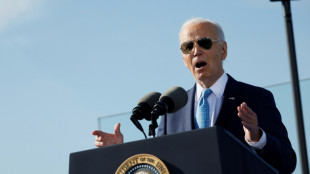
-
 De Zorzi out for 177 as S.Africa power to 413-5 against Bangladesh
De Zorzi out for 177 as S.Africa power to 413-5 against Bangladesh
-
'CEO of supercute': Hello Kitty turns 50

-
 Australia head coach McDonald handed new deal until 2027
Australia head coach McDonald handed new deal until 2027
-
Visual artist grabs 'decisive moment' to nurture Chad art scene

-
 Industrial slump leaves Germany on brink of recession
Industrial slump leaves Germany on brink of recession
-
'I'm terrified': French auteur Audiard hits Oscars trail for 'Emilia Perez'

-
 New Indonesia defence chief harks back to dictator's rule
New Indonesia defence chief harks back to dictator's rule
-
In Tennessee, the despair of gun control advocates

-
 US economy's solid growth unlikely to register at ballot box
US economy's solid growth unlikely to register at ballot box
-
'A treasure': Japan's Ohtani a hometown hero win or lose in World Series

-
 Botswana votes with ruling party seeking to extend six decades of power
Botswana votes with ruling party seeking to extend six decades of power
-
Bitcoin close to record as cautious markets eye US election

-
 Hometown hero Volpe lives dream with grand slam for Yankees
Hometown hero Volpe lives dream with grand slam for Yankees
-
Rested relief pitchers please Roberts even after Dodgers defeat

-
 UK's Labour govt prepares to deliver decisive first budget
UK's Labour govt prepares to deliver decisive first budget
-
Beijing files WTO complaint over EU's new taxes on Chinese EVs

-
 Volpe's grand slam helps Yankees avoid World Series sweep
Volpe's grand slam helps Yankees avoid World Series sweep
-
Taiwan battens down for Super Typhoon Kong-rey

-
 MotoGP world title in sight as Martin, Bagnaia set for Sepang duel
MotoGP world title in sight as Martin, Bagnaia set for Sepang duel
-
'New wave' as start-up sweeps up Thai ocean plastic

-
 Botswana votes with ruling party aiming to extend six decades of power
Botswana votes with ruling party aiming to extend six decades of power
-
How harmful are microplastics to human health?

-
 Are bioplastics really the wonder alternative to petro plastics?
Are bioplastics really the wonder alternative to petro plastics?
-
EU's extra tariffs of up to 35.3% on Chinese EVs angers Beijing

-
 Rumble in the Jungle remembered after 50 years
Rumble in the Jungle remembered after 50 years
-
Trump risks backlash with anti-trans ads targeting Harris

-
 Alzheimer's patient 'relieved' at Quebec's assisted suicide policy shift
Alzheimer's patient 'relieved' at Quebec's assisted suicide policy shift
-
Who should get paid for nature's sequenced genes?

-
 Bodies found as torrential rains slam Spain
Bodies found as torrential rains slam Spain
-
Harris urges US to turn page on Trump 'chaos' in mass White House rally

-
 Climate change driving 'record threats to health': report
Climate change driving 'record threats to health': report
-
Harris warns of 'obsessed' Trump power grab at mass Washington rally

-
 Harris warns against Trump's power grab bid in final election warning
Harris warns against Trump's power grab bid in final election warning
-
Southampton, Brentford scrape into League Cup quarter-finals

-
 PGA players council seeks smaller fields, fewer full tour spots
PGA players council seeks smaller fields, fewer full tour spots
-
Napoli extend lead at top of Serie A with win at AC Milan

-
 Harris to slam 'unstable' Trump at Washington rally
Harris to slam 'unstable' Trump at Washington rally
-
Jennifer Lopez to boost Harris at glitzy Las Vegas event

-
 Global stocks mixed as markets await Big Tech results
Global stocks mixed as markets await Big Tech results
-
Seven missing as torrential rains slam Spain

-
 Three-person crew blasts off for China's Tiangong space station
Three-person crew blasts off for China's Tiangong space station
-
Google reports strong growth driven by AI, Cloud

-
 Kyiv announces new mobilisation drive as Russia advances
Kyiv announces new mobilisation drive as Russia advances
-
Release of new single featuring late One Direction star postponed

-
 Alcaraz breezes through opener at Paris Masters
Alcaraz breezes through opener at Paris Masters
-
Bolivia 'going from bad to worse': At the barricades with Morales supporters

-
 Biden unveils $3 bn US ports boost, takes aim at Trump
Biden unveils $3 bn US ports boost, takes aim at Trump
-
EU slaps extra tariffs of up to 35.3% on Chinese EVs

-
 England boss Borthwick has no qualms over starting Slade against All Blacks
England boss Borthwick has no qualms over starting Slade against All Blacks
-
'Tootsie' star Teri Garr dies aged 79

| NGG | -1.35% | 65.12 | $ | |
| RELX | -0.52% | 47.91 | $ | |
| RBGPF | 100% | 62.35 | $ | |
| SCS | -3.11% | 12.21 | $ | |
| RYCEF | 0.55% | 7.25 | $ | |
| BCC | -5.3% | 131.64 | $ | |
| CMSC | -0.65% | 24.57 | $ | |
| CMSD | -0.16% | 24.84 | $ | |
| RIO | 0.6% | 66.58 | $ | |
| VOD | -2.8% | 9.28 | $ | |
| BCE | -0.71% | 32.46 | $ | |
| BTI | -1.31% | 34.46 | $ | |
| JRI | -0.69% | 12.98 | $ | |
| GSK | 0.76% | 38.17 | $ | |
| AZN | -1.05% | 75.22 | $ | |
| BP | -5.76% | 29.36 | $ |

Israel parliament holds vote to dissolve, Lapid set to be PM
Israeli lawmakers were voting Thursday on a bill to dissolve parliament in a move that will trigger the country's fifth election in less than four years and make Foreign Minister Yair Lapid the new prime minister.
Final voting on the dissolution bill had been expected before midnight Wednesday, but was delayed amid sparring between the outgoing eight-party coalition and the opposition led by former premier Benjamin Netanyahu.
The prime minister who led that coalition, Naftali Bennett, said late Wednesday that he will not stand in the upcoming elections, and will turn leadership of his religious nationalist Yamina party to his long-term political ally, Interior Minister Ayelet Shaked.
"I do not intend to run in the upcoming elections, but I will remain a loyal soldier of this country," Bennett said.
A definitive vote on the dissolution bill was expected within hours, with Lapid taking over as prime minister and sending Israelis back to the polls, as the nation remains mired in the worst political crisis in its 74-year history.
Lawmakers had settled on an election date of November 1.
- 'Dark forces' -
Netanyahu has promised that his own alliance of right-wingers, ultra-nationalists and ultra-Orthodox Jewish parties will win the upcoming vote, but polls show he may also struggle to rally a parliamentary majority.
Netanyahu's main challenger will likely be long-time foe Lapid, a former celebrity news anchor who has surprised many since being dismissed as a lightweight when he entered politics a decade ago.
Bennett's motley alliance formed with Lapid in June 2021 offered a reprieve from an unprecedented era of political gridlock, ending Netanyahu's record 12 consecutive years in power and passing Israel's first state budget since 2018.
As pair announced plans to end their coalition last week, Lapid sought to cast Netanyahu's potential return to office as a national threat.
"What we need to do today is go back to the concept of Israeli unity. Not to let dark forces tear us apart from within," Lapid said.
Bennett led a coalition of right-wingers, centrists, doves and Islamists from the Raam faction, which made history by becoming the first Arab party to support an Israeli government since the Jewish state's creation.
But the alliance, united by its desire to oust Netanyahu and break a damaging cycle of inconclusive elections, was imperilled from the outset by its ideological divides.
- Farewell address -
Bennett said the final straw was a failure to renew a measure that ensures the roughly 475,000 Jewish settlers in the occupied West Bank live under Israeli law.
Some Arab lawmakers in the coalition refused to back a bill they said marked a de facto endorsement of a 55-year occupation that has forced West Bank Palestinians to live under Israeli rule.
For Bennett, a staunch supporter of settlements, allowing the so-called West Bank law to expire was intolerable. Dissolving parliament before its June 30 expiration temporarily renews the measure.
In the weeks before his coalition unravelled, Bennett sought to highlight its successes, including what he characterised as proof that ideological rivals can govern together.
"No one should give up their positions, but it is certainly possible and necessary to put aside, for a while, ideological debates and take care of the economy, security and future of the citizens of Israel," he said in his farewell address Wednesday, which did not rule out a eventual return to politics.
Bennett will stay on as alternate prime minister responsible for Iran policy, as world powers take steps to revive stalled talks on Tehran's nuclear programme.
Israel opposes a restoration of the 2015 agreement that gave Iran sanctions relief in exchange for limits on its nuclear programme.
Lapid will retain his foreign minister title while serving as Israel's 14th premier. He will find himself under an early microscope, with US President Joe Biden due in Jerusalem in two weeks.
R.Adler--BTB
